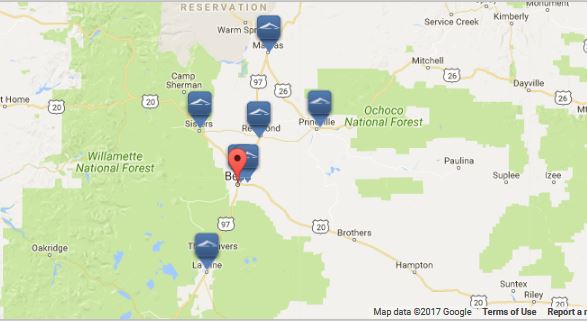The Bottom Line
Small business is important to Central Oregon, and to Mid Oregon. Find tips and resources for business, and information about Mid Oregon’s commercial services and business members.

Leading Edge Aviation-Expansion
The Bend Municipal Airport is a very important part of the City of Bend’s economic vitality. When the opportunity came up a few years ago to help one of their major businesses, Leading Edge Aviation, we were excited to be able to help. It was a good fit for us, and they have been proven to be a good partner.
Expansion in 2015 to Redmond’s Roberts Field Municipal Airport
In 2015 Leading Edge expanded to Redmond’s Roberts Field Municipal Airport with their Leading Edge Jet Center. Included are passenger & pilot’s lounges, a flight planning room, conference room, and much more. This newly renovated FBO services facility provides fueling, hangar storage, aircraft maintenance, an avionics shop, aircraft detailing and cleaning, and many other supplemental aircraft and pilot services.
We recently spoke with Marti Fraley, Leading Edge Marketing Manager, who shared about how Mid Oregon helped them with their growth and expansion.
How Mid Oregon Helped Leading Edge
How did Mid Oregon solutions help your business?
Our relationship with Mid Oregon Credit Union has been crucial to our growth. In partnership with Mid Oregon, we were able to open a line of credit and secure financing that allowed us to acquire assets, like additional aircraft for our training facility.
What did you like best about working with Mid Oregon?
By looking at our business as a whole and truly investing in relationship with us, Mid Oregon has provided an extremely positive experience. They have consistently been willing to look at the big picture of what we do, what our values are, and the long term goals we are pursuing before proposing creative ideas of how can continue to grow as a company.
What would you tell a fellow business regarding your experience with Mid Oregon, if they were looking for a recommendation?
We are always recommending Mid Oregon to fellow businesses, community members, and even our own employees, with assurances that the people at Mid Oregon are attentive, knowledgeable, and great to work with. We have always found that Mid Oregon has our best interest at heart, shown by their willingness to spend the time to get to know our business. They always put in a great amount of effort to understand our needs, offering excellent advisement as we continue to move forward.
Brief description of the expansion:
We are currently working closely with the city of Bend, Connect Oregon, and the FAA to do a major expansion of the Northeast side of the Bend Municipal Airport. This expansion will significantly extend our facilities, improve our capabilities and give us more room to grow.
More About Leading Edge Aviation
In 2006, Leading Edge Aviation started helicopter flight training operations at Bend Municipal Airport. Flight volume has increased every year and now represents a large portion of Bend Airport activity. At the Flight School they also train fixed wing aircraft, or airplane, pilots. They offer a program through Central Oregon Community College for students pursuing a degree in Aviation, having a variety of aircraft available, in addition of 2 flight simulators owned by COCC.
Their centrally located FBO, at the Bend Municipal Airport, continues to provide domestic and international customers with quality fuel and services, delivering quick turnaround while maintaining high safety standards. Services include courtesy Cars, restrooms, kitchen, conference room and more. Other services they provide are fueling, aircraft maintenance, airplane, helicopter and part sales, leasing, and charters.
They have charter services available, and a great variety of Central Oregon helicopter tours. Specific tour options include Wine Tasting, Mt. Bachelor Winter Wonderland, Bend City & Lava Lands, Cascade Mt. Ring of Fire, and for this year, the “Helicopter Luxury Champagne Eclipse Basecamp 2017”.
 Leading Edge Main Office and Flight Academy
Leading Edge Main Office and Flight Academy
Website: flyleadingedge.com
Address: 63048 Powell Butte Highway, Bend, OR 97701
Phone: (541) 383-8825
Leading Edge Jet Center
Address: 1050 SE Sisters Ave, Redmond, OR 97756
Phone: (541) 504-3848

Mid Oregon Credit Union Reaches Milestone
Central Oregon’s Mid Oregon Credit Union, headquartered in Bend, just reached another major milestone. At the first quarter of 2017 Mid Oregon Credit Union announced that its assets surpassed $250 million for the first time since establishment in 1957.
Growth With Addition of Two New Branches
The credit union has pursued an aggressive growth strategy with the addition of a new La Pine branch in June 2016 and a Sisters location opening in the next few weeks. To support continued growth, we have invested in the purchase of an administrative office building in mid-2016. We have experienced strong growth and increased market share in deposits and loans, just recently recognized for 100,000 loans to members since inception.
“This major milestone reflects the strength and stability of our financial institution and the strength of the Central Oregon economy,” explained Bill Anderson, President/CEO. “We work hard to build relationships and trust with our members and our community. Our single focused commitment to Central Oregon sets us apart from other financial institutions. People are interested in Mid Oregon Credit Union as a preferred local provider for financial services.”
Competitive Rates Driving Membership & Loan Growth
Financial reports for Mid Oregon indicate that our members have been attracted by the institution’s competitive loan rates, particularly those associated with vehicle loans, Visa credit and commercial lending.
“We are seeing very strong membership growth and the associated deposits, lending and checking accounts.” said Kyle Frick, VP Marketing. “Products and services like Simply Free Checking, mobile deposit, debit card security app (CardNav), and Home Equity loans and Lines of Credit are helping members with more convenient access to their accounts, saving time and money.”
Mid Oregon Credit Union is a full-service, member-owned, financial cooperative that has served Central Oregonians since 1957. With well over 26,000 members in Deschutes, Jefferson, Crook, Wheeler, Lake, and North Klamath Counties, Mid Oregon Credit Union is helping members meet their financial needs and dreams. For more information about Mid Oregon Credit Union services and branch locations in Bend, Redmond, Madras, Prineville, La Pine and Sisters, please visit www.midoregon.com.
From Mid Oregon Press Release dated 3/7/17
Other Recent Mid Oregon Milestones
- Mid Oregon Surpasses 100,000 Loans Since Inception
- 2016 A Growth Year For Mid Oregon
- Mid Oregon Credit Union Celebrates 59 Years
- Celebrating 12 Years of Adopt-a-Bear– Starting the 13th year on April 3rd!
- Mid Oregon Receives Approval for Expansion

Junior Achievement Bowl-A-Thon Raises $30,000 for Central Oregon Students!
Mid Oregon Credit Union is proud to be a consistent participant in the Central Oregon Junior Achievement Bowl-A-Thon. This year, on March 9th, the Bowl-A-Thon (BAT), held at Sun Mountain Fun Center in Bend, brought forty teams together providing the primary source of funds for local Junior Achievement (JA) programming.
Mid Oregon fielded 3 teams of five people each, and had the majority of bowlers on the local Central Oregon Chapter of Credit Unions team. Between all 18 Mid Oregon bowlers and financial support generated by our “Jeans 4 JA” Day on March 3rd, we contributed about $3,500. Thanks to all the bowlers who raised the funds, and a special thanks to all the Mid Oregon and Central Oregon community members who also supported us.
What is the JA Bowl-A-Thon?
The Bowl-a-Thon is Junior Achievement’s annual fundraising event. Over 40 company teams and 200 individuals participated in the 2017 event. Companies throughout our community formed teams of bowlers with each bowler raising money from family, friends and colleagues. Bowlers were guaranteed to have fun while mingling with other participants and enjoying donated pizza, beer and Pepsi all to benefit Junior Achievement of Central Oregon!
What Impact Does JA Have On Central Oregon?
• Over 2,000 students in more than 65 classes will receive volunteer-led JA programs comprised of five to seven one-hour sessions.
• By incorporating their own experiences, volunteers help translate classroom theory to real-world application using a prepared JA kit with all needed lessons and materials.
• JA Finance Park, geared toward middle and high school students, combines teacher-led sessions with a one-day, high-tech immersed financial literacy simulation located at the Redmond Expo Center during the week of April 17, 2017. Volunteers mentor students as they compare costs of typical household expenses, develop a balanced family budget and learn to live within their means.
About Junior Achievement
Junior Achievement empowers young people to own their future economic success by delivering volunteer-led, in-class programs to students in grades K-12 which provide them knowledge and skills in three critical areas: work readiness, entrepreneurship and financial literacy. Founded nationally in 1919, JA’s Central Oregon district office opened in 2011.
Junior Achievement’s vision is to have students at all grade levels equipped to be future productive, thriving members of our community. We’ll do that by partnering with educators and JA volunteers who share their time and talent to mentor students. Of course, organizations and individuals willing to contribute their financial resources are a needed component too.
Bowl-A-Thon Participation Organizations
KIng Pin Sponsor: Wells Fargo
Supporting Sponsors: St. Charles Health System, Columbia State Bank, Summit Bank, Vacation Internationale & Umpqua Bank
Corporate Sponsor: Cascade Natural Gas
Lane Sponsors:Assist 2 Sell, Newport Avenue Market, Bigfoot Beverages, Croutons & Hayden Homes
In-Kind Sponsors: 10 Barrell, Deschutes Brewery, Bigfoot Beverages, Red Plate Foods & Atlas Cider
| Participating Team Organizations- multiple teams = (m) | ||
|---|---|---|
| Ascent Architecture | Arbor Mortgage | Bank of the Cascades |
| Central Oregon Chapter of Credit Unions | Central Oregon Realtors | Columbia State Bank |
| Consumer Cellular (m) | Deschutes County Title | Francis, Hanson & Martin |
| Hayden Homes | Jones & Roth CPAs | Karnopp Peterson |
| Mid Oregon Credit Union (m) | Newport Avenue Market (m) | OSU Cascades |
| Prime Lending (m) | Redhawk Network Security | Redmond School District |
| St. Charles Health System | Starbucks (m) | Summit Bank |
| Umpqua Bank (m) | US Bank | Wells Fargo (m) |
| Bowl-A-Thon 2017 Pictures | |
|---|---|
 |
 |
 |
 |
 |
 |
 |
 |
